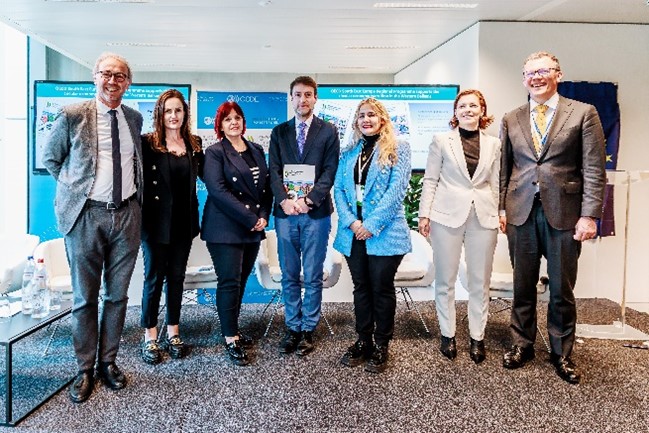REVISITED - WORLD CIRCULAR ECONOMY FORUM 2024
Discussion details
The WCEF 2024 in Brussels showed off some creative and different business models in the construction, fashion-textiles, plastic/packaging, digital, agri-business, energy and critical raw materials sectors. It also showed how the circular economy can help us create more jobs, improve people's lives and make Europe and the world more independent. It was made clear throughout the sessions that if we want to tackle global challenges like climate change, biodiversity loss and pollution, we need to address unsustainable material consumption. This is the only way to ensure a just transition to more sustainable and circular economies.
Review some of the highlights of DG ENV, DG NEAR, and DG INTPA’s participation in the 2024 edition.
Speakers of the EU took the floor in several sessions. Commissioner Urpilainen announced two new major initiatives that got a lot of attention and support. The first is the EU Circular Economy Resource Centre (EUR 15 million over four years). This is aimed at mobilising EU know-how to support partner countries. The second is the SWITCH to Circular Economy in East and Southern Africa initiative (EUR 40 million over 5 years). INTPA Deputy Director General Martin Seychell took part in a panel on European and global policy, investment and innovation perspectives. He said that we need to work across policy areas and make this work for people. DG Environment Florika Fink-Hooijer spoke on a panel titled 'The circular economy we want for Europe 2024-2029' and ENV Director Astrid Schomaker took part in an event on China’s pathway to a circular economy, where she made the point that there needs to be more convergence between Europe and China.
DG NEAR also co-led two accelerator sessions on circular reconstruction in Ukraine with UNIDO, and Private Sector Solutions for a Circular Economy with OECD. The Deputy Minister of Economics from Ukraine highlighted how the Circular Economy (CE) approach is integral to Ukraine’s economic reconstruction plans, turning challenges into opportunities.
Director Mathieu Bousquet emphasized the importance of circular principles for creating strategic alliances and sustainable value chains. He highlighted successes from EU-funded initiatives, including €16.2 million in projected investments for 125 circular startups incubated through the SwitchMed programme, and 200 business cases published across the Eastern partnership region by the EU4Environment project. The launch of CE roadmaps for Albania (image below) and North Macedonia marked a significant achievement from the EU-OECD project, aimed at boosting competitiveness and sustainability in the Western Balkans.
Additionally, INTPA-NEAR hosted "The EU in the Global Circular Economy Transition: Inspiration, Incentives, and Market Leverage," and the "Switch to Green Annual Coordination" meeting, aligning with WCEF2024 to facilitate vibrant discussions and opportunities for synergy among EU-supported initiatives. An EU (INTPA-NEAR-ENV) Stand drew a lot of attention on EU’s external action on circular economy: A map displayed key INTPA and NEAR projects interactively and paperlessly through QR codes. Highlights included a series of lively interviews by DG NEAR, featuring Director Mathieu Bousquet in conversation with Young European Ambassadors from Egypt, North Macedonia, Serbia, Ukraine, and the young Climate Ambassador for Belgium, who focuses on Ukraine.

Log in with your EU Login account to post or comment on the platform.